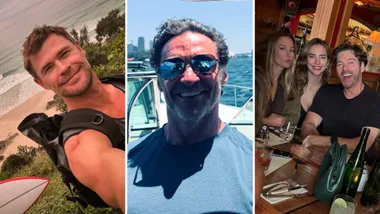Exclusive extract from This Way to the Sea by Gillian Nicholson.
Bindi’s vanished, so Christo gives her a whistle. We hear her crashing through the bush before we see her parting a sea of tall grass as she runs to us. She throws herself onto the lawn at our feet, grunting and rolling and wiping her head with one paw, her beard matted thickly with black cobbler’s pegs. Other people call them farmer’s friends, but I remember them from my childhood as cobbler’s pegs, the little black spikes clinging to my clothes any time I played in the bush around our Brisbane home.
I don’t have a brush to groom Bindi; her curls will have to stay weed-thatched until we get back to Sydney. I don’t think she’s the least bit bothered.
That night, out on the veranda, we sip red wine and listen to CDs on an old sound system, an ex-rental Christo bought from a shop in Sydney. He can’t last a day without music.
We hit the thin foam mattresses to the velvet crooning of the Mills Brothers singing Lazy Bones, not to sleep but to wonder at this amazing thing we’ve done. Our bedroom faces the sea and is so high it seems we’re floating in the clouds.
A big storm is breaking on the horizon, bolts of jagged electricity occasionally spearing the sea while sheet lightning dazzles the sky all the way from the Rocks to Nambucca. Thunder rolls around us, bringing Bindi to her feet on the veranda outside our bedroom, tail wagging with excitement. Warm under the sleeping bag, snuggled up to Christo, I’m awash with happiness and optimism.
The storm rumbles on all night, waking us from time to time, but never disturbing the spell. Morning is just as magical, dawn breaking suddenly across the now tranquil sea, sunlight flooding our uncurtained bedroom and blinding us with molten silver.
What a way to wake up. From our spot on the floor, the view is breathtaking: shimmering ocean and hills of green. The call of a whip bird slices through the silence, and then a kookaburra begins to laugh and sets off a raucous, happy throng.
‘Listen,’ says Christo, as the din subsides. He gets up and opens the sliding glass doors to the veranda, where a sleepy dog greets him with a yawn.
I grab my glasses from the floor and follow. ‘What?’
‘That bird. Can you hear it?’
I can hear it: it sounds like a flute. ‘Yes. It’s beautiful.’
‘But can you hear the tune it’s singing? It’s the theme from Raiders of the Lost Ark. Listen,’ and he hums along with the bird.
I close my eyes and concentrate on the bird’s song. I think I can hear the Raiders tune but…
‘It’s that magpie,’ Christo whispers, pointing to the top of the nearest mango tree, and we creep to the edge of the veranda.
‘So it is,’ I whisper back. Its open beak thrust to the sky, the small black-and-white bird reprises the lilting melody, and I’m half convinced Christo is right.
‘Let’s go back to bed, love,’ I say, taking his hand.
We spend the morning drifting in and out of sleep, bathed in a light that changes from silver to gold and then orangey pink. I’m feeling unbelievably wealthy today.
Our house stands on a long, grassy strip of land where Brian once grew a magnificent heliconia. The area is bare now except for a mango tree at either end, just the right spot for playing pétanque. I picture us sitting in the shade of the mango trees, catching sea breezes and sipping Campari and soda as we take turns to toss the silver balls.
Beyond the far mango tree, only just visible from the veranda, is a small corrugated iron shed. I have plans for that too. Chooks. Bindi will keep the foxes away and we will have plenty of fresh, organically produced eggs. (There will be no poison used on our farm, of course.)
We’re dying to show off the property. Two days after we arrive, Mum’s due to drive down from Brisbane and we’ve also invited our friend Ian, a mate from Melbourne. Ian knows a lot about running a farm, having grown up in the Victorian countryside with a dad who loved to grow things, and having farmed in Tasmania himself.
Flowers don’t interest him much, but he’s managed to feed his own family from backyard garden plots for years and has even written a book about it all, with heaps of ideas on everything from raising seeds and DIY hydroponics to backyard irrigation and…chooks. Ian is dead keen to see the place and we’re dead keen to get his input. We dub him “The Mentor”.
He arrives the next morning, fully prepared for roughing it, because we’ve told him there’s no furniture in the house apart from our mattresses, the sound system and a few bits to cook with.
‘This is a bit of all right,’ he says in greeting, hands on hips and turning to enjoy the view. He unloads the car with vigour and smartly assembles a stretcher bed in one of the bedrooms. Then he unfolds a picnic table with built-in bench seats in our lounge room, sets up a camp stove in our kitchen ‘just in case’ and pulls a video camera out of his travel kit.
‘What a truly lovely spot,’ he says, plonking on the safari hat he likes to wear (and I have admired so much in the past that Christo has bought me one for Grassy). Let’s have a cuppa, then you can show me around.’
We’re limited to regular tea bags, but Ian — always ready for anything and everything — extracts from a well-organised milk crate a container offering several tea varieties. He chooses Lapsang Souchong.
It’s been a humid morning, with a fine mist hanging tentatively in the gullies and low spots below the house. Now it’s drizzling, but the rain is warm and not unpleasant so we decide to chance a walk around the property. Ian puts on a jacket to protect the video camera.
Since Ian has already driven along our southern boundary, we head down the other side of the hill towards Yarrahapinni National Park. It’s out first time going around on foot.
Strewn with large rocks and rutted by the heavy rains of many summers, the track isn’t easy to negotiate. We pick our way down the hill between a straggling barbed wire fence that sags between old timber posts and neat rows of bananas as far as the eye can see.
‘Hang on. First shot,’ Ian says, removing the video camera from under his jacket. ‘The rain’s holding off. I want to get you over near the bananas there.’
Several of the bananas have long, plastic bags of different colours draped over their bunches of unripe fruit.
‘What’s the significance of the colours?’ Ian asks.
I have no idea. With a shrug, I move into shot and pick up a longish stick so I can lift the skirt of one of the bags and peer up into it without getting too close to what might be in there with the bananas. I prod around hesitantly.
‘Got to be careful of snakes in bananas. Green snakes. They won’t kill you but they can give you a nasty bite.’ It’s not the answer to his question but it’s one of the few things I do know about bananas, having been raised in Queensland.
So Ian answers his own question. ‘Different colours for different maturing times, I reckon.’
Bindi has run off somewhere through the grass and, although we can hear her thrashing around somewhere below, she doesn’t come to our calls. The infamous Airedale stubbornness.
Suddenly there’s an angry quacking followed by a huge splash, and we see four ducks take flight above the dam. Within minutes, a wet and muddy dog is back with us, curly hair flattened against her panting body and full of grass seed, and on her face the biggest grin a dog can do.
Book Group questions
Should Gillian and Christo have thought their decision through to buy a banana farm more than they did?
Is a sea-change an illusory concept and given the hurdles and problems that face the couple in their new home, is there something to be said for enjoying retirement or semi-retirement in your own community?
Other than the perfect view, what is it about their sea-change that enhances the couple’s lives?
Have the locals a right to resent some of the changes retired baby boomers bring with them when they re-locate to small coastal communities?











